7 Super Ways To Fix Shopping Cart Abandonment & Increase Conversion
Shopping cart abandonment is a frequent customer behavior and a widespread e-commerce problem online.
There is nothing different about it and almost 69 percent of all e-commerce visitors abandon their shopping carts for some reason or the other. That means nearly every ecommerce site is plagued by the shopping cart abandonment issue. However, while this can cause online retailers a lot of unexpected pain, the thing is that businesses are losing more than just successful customer conversions.
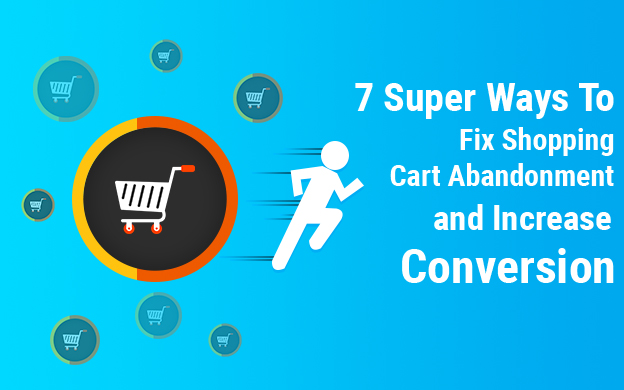
Does Shopping Cart Abandonment Means More than Just Conversion Loss?
When cart abandonment is rising, how will you compare your profits to the total amount of investment you make on your website improvement? Here is a simple equation that you can use to calculate your annual shopping cart abandonment rate –
AR = { 1 – Transactions Completed / Transactions Initiated }
The above transaction is based on the total number of transactions completed and the number of transactions that were initiated at first but were left forgotten about.
Applying this maths to a hypothetical explanation – If the annual cart completion rate of a website increased by 5 percent, from 25 percent to 30 percent, then this is what some of the websites would be generating every year –
- A website making an investment of $500 K/year will then earn a revenue of $600 K/ year
- A website making an investment of $ 2 million/ year will then earn a revenue of $ 2.4 million/ year
- A website making an investment of $ 8 million/ year will then earn a revenue of $ 9.6 million/year
You can learn more about this observation in order to understand how to find better ways to stop shopping cart abandonment. But the observation points out clearly – Shopping Cart Abandonment is a major issue and it is costing you more than just customer loss.
Why Customers Abandon Their Shopping Carts is not a Mystery
The reasons are obvious. In fact, here is a very neat pictographic description below pointing out some of the very common reasons of shopping cart abandonment. See if you can relate to the following reasons –
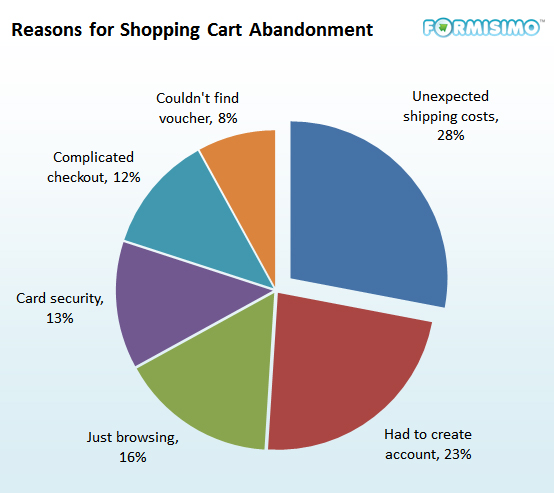
Image Courtesy: formisimo.com
However, an abandoned shopping cart is often a misused conversion metric. It can lead you to a greater purchase path online. Customers may abandon their carts midway but this could become an ongoing shopping list that can ultimately push a customer to complete one’s in-store purchase. A few smart strategies is just you would be needing here to give your customers the nagging push.
Consider this factual breakdown first to understand buyer behavior online –
- 99% of the visitors won’t purchase anything on their first visit to a site.
- Out of these 99%, 25% will never return while 75% will intend to return.
- If out of these returning visitors, some abandon their cart for a second time, then 53% will not be returning again within 28 days.
- Out of the remaining 47%, only one in four will finally purchase.
- Customer behaviors are sometimes hard to predict. Many would require making a series of visits and abandonments before they finally consider purchasing.
- So it is best to realize that only 3% of new customers and 11% of returning visitors who have made a recent purchase are likely to buy again.
Buyer behaviors can be tracked by Advanced Analytics Dashboard for E-commerce Platform
Keeping all these considerations in mind, here are some measures and strategies that you can use to successfully reduce shopping cart abandonment to its minimum rate –
#1 – Don’t Complicate Your Checkout Process Page
Complications can spoil the show. So instead of designing a checkout process page with eight different steps, make it simple so that customers can reach the finishing line at one-click. Did you know making a web page two seconds faster can boost your conversion rate by 66 percent?
#2 – Do Not Get Over Restrictive
Security is a big issue for both the parties – customers and retailers. But let’s not hope that you are putting down some restrictions on your customer payment options. That could be a huge disappointment and it’s definitely not the right customer service attitude. Make sure you have multiple payment options laid out and of course, be transparent about what you don’t accept. Customers can understand and rather not be disappointed.
#3 – Manage Your Creative Triggers
Messages like special discounts and coupons can trigger effective conversions. Nevertheless do not give them away for every product purchase. Here is what you can do instead – give out offers depending on what’s inside their shopping cart. For example, high priced items can come free of any shipping costs.
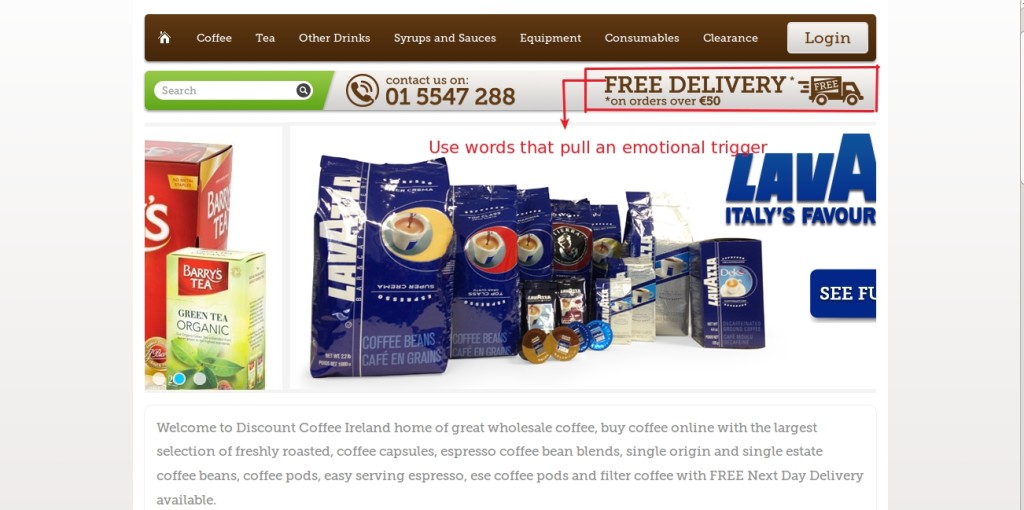
Website Link courtesy – discountcoffee.ie
Again, there are certain products that might require longer decision making time frame. In such cases, a simple reminder will be enough to trigger a customer response.
#4 – Avoid Using Halt Words
These are generally elements that tend to slow down a customer’s checkout process. Even a good copy can stand in the way
and therefore it is best to keep things to its minimum in your checkout page.
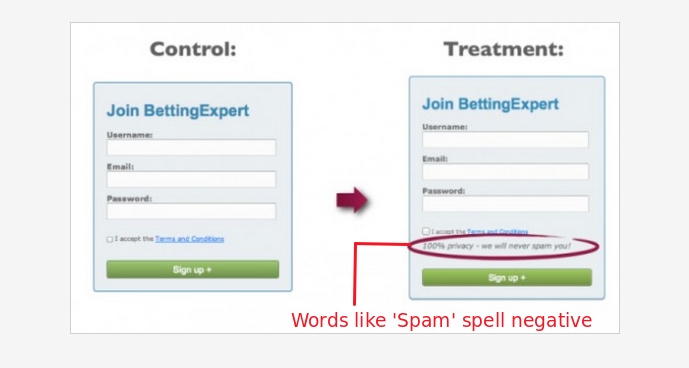
Website Link courtesy – formisimo.com
Here are some good customer development copy writing suggestions that you should follow –
- Make sure that your checkout form headline matches with the copy on your submit button. For example, if the headline reads: ‘Start Your 30 days Free Trial’, then your CTA button copy should also read ‘Start Free Trial’.
- Avoid using negative words in your privacy policy wordings. Things like ‘Spams’ can leave negative connotations in the user’s mind and therefore can discourage conversion.
- Make sure your CTA buttons use action words like download and get.
Read More: 5 Deadly E-commerce Web Design Mistakes You Should Avoid
#5 – Be Clear about Your Transaction Costs
Hidden charges are terrible things and are not at all customer friendly. Imagine picking out items at the grocery store and taking them to the counter for billing. You have taken care to select only those items that are affordable and within your budgetary limit. However, disappointment crashes in when the man at counter announces your total price, inclusive of taxes and other extra charges like packaging fee, bagging fee and card processing fee. Would you continue with your purchase?
It depends. In my case I would have been left with no other option than to purchase only the things that were necessary and leave out the rest. However, this would have been my last purchase in that grocery store. This would however not be the same when I am shopping online. I might even feel more at ease to abandon the shopping cart instantly if I am not happy with the total cost. 56 percent of customers leave without paying because of unexpected hidden costs and is one of the reasons why online retailers are losing 67.45 percent of their sales.
Think too much of transparency might harm your business? Well, transparency is better than trickery.
Check out this graph that shows unexpected shipping costs topping the list of reasons why customers abandon a shopping cart –
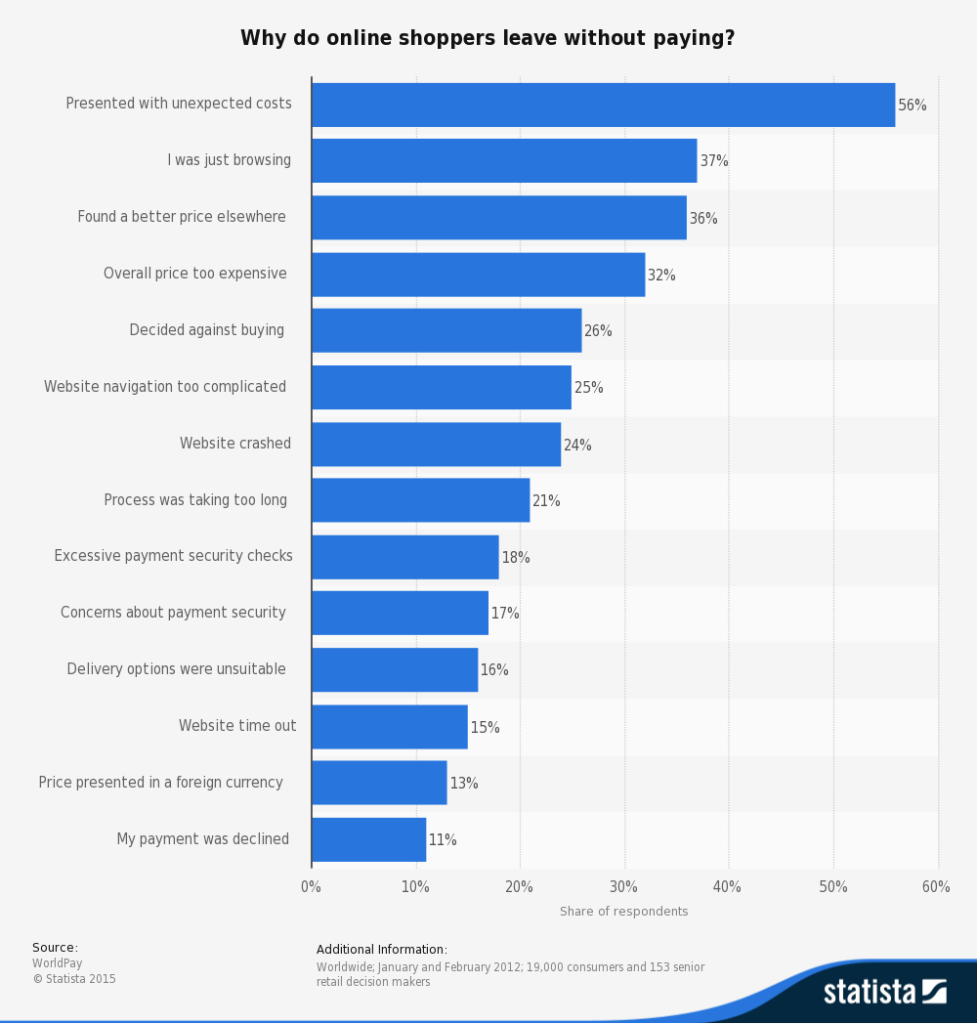
Source: www.statista.com
#6 – Reap the Goodness of Re-marketing Tools
90 percent of marketers are unanimous about the goodness of re-targeting strategies, which are sometimes better than standard digital marketing strategies.
Implementing re-targeting tools like emails and social ads continue to visit your visitors even after they have left a website without checking out. So why not discuss a little bit about them and the benefits they give to a business even after shopping cart abandonment –
- Email Remarketing
Email remarketing is a form of newsletter but it is different from email marketing. An email marketing is basically a one-size-fit all message that businesses send to customers, to talk about any new arrivals, special arrivals or for sign-ups. It is hence called a newsletter and it is directed to new and existing customers.
Email remarketing on the other hand is designed to try bringing long lost customers or visitors back to a website and complete their purchase. Since you have already met this customer before, you are well acquainted with the customer’s behavior and preferences. Now you are utilizing this acquired data to send your client a customized message.
Relevancy and Personalization are the two things that you will find the most in an email remarketing. Because these are that things that get customers clicking on your email link and lead them to the checkout page that they had previously abandoned. Here is an example of a newsletter that works on these two things –
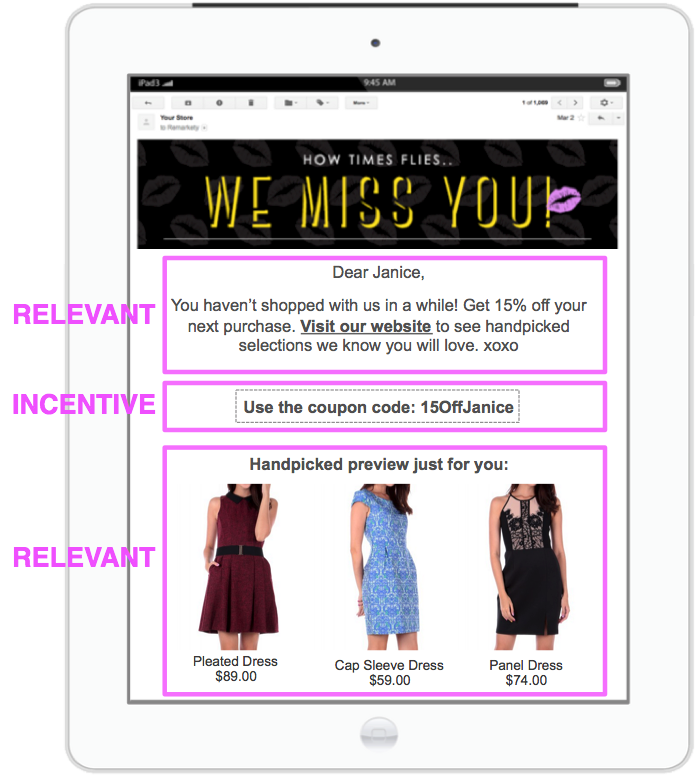
Image Source: remarkety.com
- Social Ads Remarking
Social media platforms can not only help start a conversation, but these are also the last of the places where businesses can make their customers complete an online purchase.
Mathew Ho in his article shares a wonderful shopping experience with his readers that was actually driven by a social media ad on Facebook. Here is the snapshot of that ad copy –
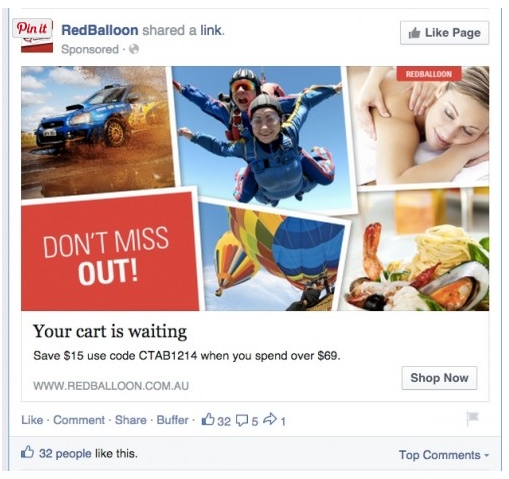
Social media ads are today a worthwhile component that any businesses can invest and be assured to reap positive benefits. They allow you to focus all the attention on a segmented few, who seem more likely to purchase if given the proper emotional push. Since you already know a lot about the customer and in what state he had left your site, you can easily take him back to that already pre-filled check-out page, just the way he or she had left it. The customer does not have to redo the fill in details again. He can simply click on the final CTA button and check out.
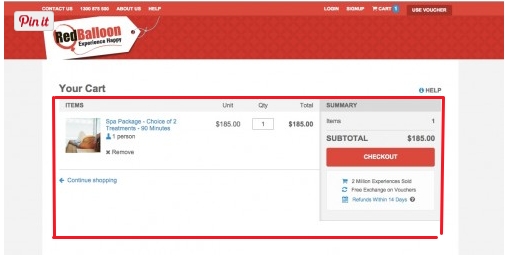
They are like PPC ads for which social sites will charge you for every click. However, it is worth investing on. Work gets easy for both sides and so does the entire checkout process.
#7 – Reconsider Your Strategies
The question of shopping cart abandonment is a long term assumption. Which is why retailers must try to reconsider their strategies with effect to recency. Here are some strategies that can help you convert visitors into buyers –
- Combining the functions of a shopping list with that of your website’s shopping basket.
- Re-evaluation of the customer behavior metrics is a must for every retailer. While hidden terms and goods might be some of the reasons signifying customer dissatisfaction, there are other that can indicate a precursor to a return purchase.
Also Read: Turn Your Old Blog into an E-commerce Business for Better Conversion
#8 – Never Forget Your Online CR Courtesy
Customer relationship can sound like a simple term. However, these are the little things that can leave behind a powerful impact if maintained carefully.
Every retailer values the importance of loyal customers and the necessity of good customer relationship management. The higher you ramp up your customer relationship strategy, the better it becomes. For example, just the other day I booked a movie ticket from a reputed site. Just when I was getting ready for the movie, a reminder message popped out on my phone to inform me that it was time for me to leave and go to the theater. I like being punctual especially when it comes to catching a good movie but honestly I was pleased to find a service that really showed how much it cared for its customers.
Now that’s what I call good customer relationship courtesy and the perks are that, it leaves a good feeling in your customer’s mind.
You can also cut down your shopping cart abandonment rate.
But you need to put the suggestive points down to practice in order to see the effect. These little changes can get your online business boiling with profits that you would love to taste. Get cracking!
- The Last Human Job? Reimagining Work in the Age of Automation - January 25, 2025
- Eye-Catching Thumbnails: A Powerful YouTube Channel Growth Tool - November 26, 2023
- Unlocking the Tech Trick: How to Create Gmail and Google Voice Without a Number - October 21, 2023





